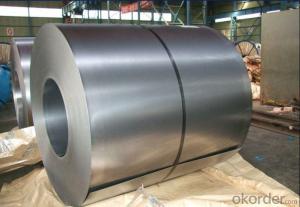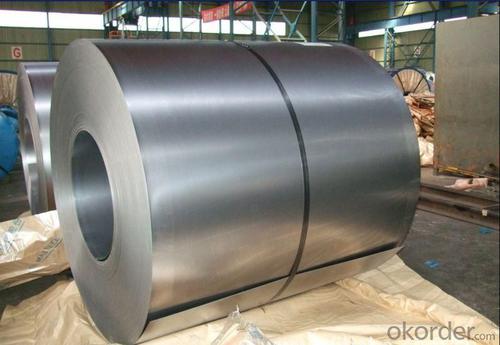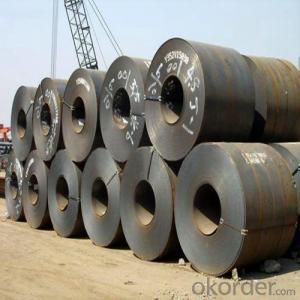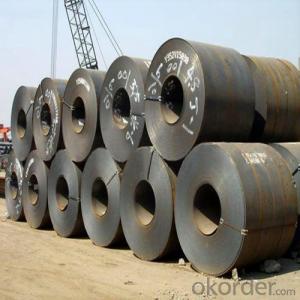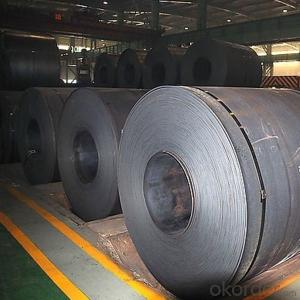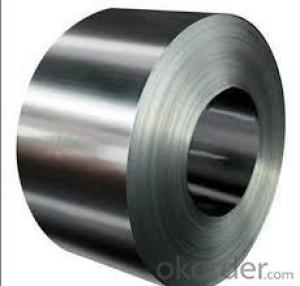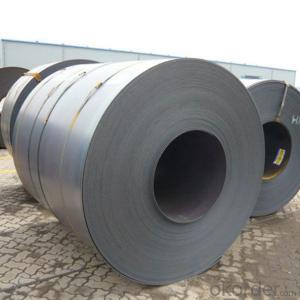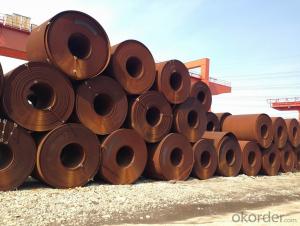Good Quality Cold Rolled Steel Coil
- Loading Port:
- China Main Port
- Payment Terms:
- TT OR LC
- Min Order Qty:
- -
- Supply Capability:
- -
OKorder Service Pledge
OKorder Financial Service
You Might Also Like
Product name | cold rolled steel coil |
Technical | Cold Rolled /hot rolled Stainless Steel |
Type | Stainless Steel coil |
Finish | BA |
Color | green, other colors are available. |
Thickness | 0.5mm to 2.0mm |
Width | 1220mm |
Length | 2440mm |
Standard | GB, AISI, ASTM, EN, JIS |
Material Grade | 201(1Cr14Mn6Ni1N),202(1Cr16Mn8Ni4N),304(0Cr18Ni9),316(0Cr17Ni12Mo2),316L(00Cr17Ni14Mo2),409(0Cr11),410(00Cr12),430(1Cr17), etc |
Brand name | ZPSS |
Packaging | PVC/PE. wooden pallets/boxes/cates/cases |
Delivery time | 10-30 days |
MOQ | 85pcs |
Payment terms | T/T |
Application range | Baggage handling equipment Baking equipment Chemical processing equipment Washing machine interior Coffee maker Cookware Counter tops Dairy handling equipment Elevator panels Dish washer drums Escalators Entry doors Fire doors Flatware Storage containers Kitchenware Jewelry Metal roofing Microwave oven interior Nuclear vessels Refrigerator panels Facades/feature walls/decorative walls Signs and nameplate Sinks Splashbacks Stove tops Furniture Hardware Fireplace fronts Tableware Automotive parts Storage tanks & pipes Water treatment equipment Window frames Rails Floors, balustrades& stair cases Roofing materials Column cladding sheet Decorative building materials Vehicle frames Cargo containers Commercial kitchen Surgical instruments Hopital equipments Bridges Public facilities Monuments and sculptures Elevator cabins Kitchen cabinets/cupboards Closets |
Note | customized sizes are available. |
| | |
| | |
| | |
| | |
| | |
| | |
| | |
| | |
| | |
| | |
| | |
| | |
| | |
| | |
| | |
| | |
| | |
| | |
| | |
| | |
- Q: Can you reload spent casings if they are steel?
- Let me break it down for you. 1) There are two kinds of priming in current use these days -- you cannot tell from the outside which primer it is...only by looking inside the casing. If the casing has a single center primer hole, it is Boxer primed. If the casing has multiple primer holes, none of which is center, it is Berdan primed. Berdan and Boxer are the names of men who designed the priming systems.
- Q: All the steel straps that secure my deck and stair 6x6 posts to the concrete piers have some rust on them. Had bought a rust reducer to spray on them and repaint. As I went to do this I found that one of them is on its last legs, with the steel rusted through and bubbling up all up the sides of the straps. Since this is the end post on a row of 3 deck support posts, I was thinking of removing as much rust as possible, then paint with Rustoleum and cover lower post with something to keep water away from post and pier in the future? Was thinking of something removeable so I could check on it for further rusting. What do you folks with building experience think of this? Thanks.
- If these steel straps are rusting through and on their last legs, a coat of paint is going to be cosmetic at best. Replace these straps with new ones. The originals were either very poorly galvanized, or you live someplace with a very corrosive environment. In any event, paint can't save this sort of thing. Steel brackets serve a real purpose, and after they're weakened, they can't do that anymore. How would your home hold up in an earthquake, for example? What you're proposing doesn't sound safe.
- Q: so I am trying to drill holes in stainless steel shelving to hang something but my drill wont make any more than a small dent in the steel. I bought a bit for hard metals but it didn't do any better. I have an admittedly small drill (9.6v). is that the problem? do I just need a more powerful drill? any serious advice is appreciated. thanks
- Just put drops of water at the spot of drilling to keep your drill bit cool. The reason your drill bit gets dull is because it gets hot and melts.You may need to re sharpen your drill bit or purchase a new one.
- Q: What are the common standards and specifications for steel coils?
- There are several common standards and specifications for steel coils that are widely recognized and used in the industry. Some of the most common ones include: 1. ASTM A36/A36M: This specification covers carbon structural steel shapes, plates, and bars of structural quality for use in riveted, bolted, or welded construction. 2. ASTM A572/A572M: This specification covers high-strength low-alloy columbium-vanadium structural steel shapes, plates, sheet piling, and bars for applications in bolted, riveted, or welded construction. 3. ASTM A653/A653M: This specification covers steel sheet, zinc-coated (galvanized) or zinc-iron alloy-coated (galvannealed) by the hot-dip process. 4. ASTM A1011/A1011M: This specification covers hot-rolled, carbon, structural, high-strength low-alloy, high-strength low-alloy with improved formability, and ultra-high strength steel sheet and strip in coils. 5. JIS G3302: This Japanese Industrial Standard specifies the requirements for hot-dip zinc-coated steel sheet (galvanized steel sheet) and strip. 6. EN 10111: This European standard specifies the requirements for continuously hot-rolled low carbon steel sheet and strip for cold forming. 7. ISO 3575: This International Organization for Standardization standard specifies the requirements for hot-dip zinc-coated and zinc-iron alloy-coated steel sheet and strip. These are just a few examples of the common standards and specifications used for steel coils. It is important to note that different industries and applications may have specific requirements, so it is always advisable to consult the relevant standards and specifications for the specific application.
- Q: I have a steel plate 3' long x 2 wide x 3/16 thick. I have a 1/2 diameter hole with the center 3/4 from the end. Tensile strength is 38,000psi. A chain goes through the hole and is connected to a load. how does one determine how much tension the chain can have before it rips through the hole?
- Your title asks for the working load, yet your problem asks for the failure load (ripping the plate). These are two different things, since there must be a factor of safety on the failure load to get to the working load. The factor of safety varies from code to code and depending on what the plate/chain is being used for. The failure load would be the net cross section of the plate (after subtracting out the hole) x the strength of the plate. In this case it would be (2 - .5)*3/16*38000psi=10,687.5 lbs You would also need to check the strength of the chain to make sure that it doesn't break before the plate.
- Q: How are steel coils used in the production of metal staircases?
- Steel coils are used in the production of metal staircases as the main raw material. They are uncoiled and cut into sheets, which are then shaped and welded to create the structural components of the staircase, such as the stringers and treads. The strength and durability of steel make it an ideal material for constructing sturdy and long-lasting staircases.
- Q: How are steel coils used in the manufacturing of industrial conveyors?
- Steel coils are used in the manufacturing of industrial conveyors as they provide a sturdy and reliable base for the conveyor systems. The coils are typically formed into various shapes and sizes to create the conveyor frames and supports, ensuring durability and stability throughout the conveyor's operation. Additionally, steel coils can be cut and shaped to form conveyor belts, which play a crucial role in transporting materials and products efficiently within industrial settings.
- Q: I also heard Stainless holds up better againts rust, blue steel needs more care.
- Stainless steel requires less maintenance, but I've got a K-38 Combat Masterpiece from 1974. Back then SW used the real blueing process, and the blue steel looks like its a foot deep. Probably the best looking gun in the accumulation. Still new in the box, never fired. Its my Vietnam tribute gun, same one I carried as a Security Policeman in the Air Force from 1969-1971.
- Q: What are the common coil processing methods?
- Some common coil processing methods include slitting, cut-to-length, leveling, and blanking. These methods are used to transform large coils of metal into smaller, more manageable sheets or strips for further manufacturing processes.
- Q: I'm quite confused...i watched all of steel angel kurumi (the 28 episodes) and then continued to steel angel kurumi zero. it was an entire different story line with only the steel angels being the same. the world is different the guys are different, and there is a new character. Even the humor is gone. its like a whole different series. So what gives, what is the relationship between them?
- Steel Angel Zero is an OVA (Original Video Animation), a very short animation that went straight to DVD. It probably was written because Kurumi was so popular, and the producer wanted to check the waters for whether they should make a second season. It's pretty hard to keep track of what anime is which, especially in the more popular series. If you think Zero is worth zero, try Steel Angel Kurumi 2 (anime, 12 episodes), and Steel Angel Kurumi Encore (OVA, 4 episodes) as well.
Send your message to us
Good Quality Cold Rolled Steel Coil
- Loading Port:
- China Main Port
- Payment Terms:
- TT OR LC
- Min Order Qty:
- -
- Supply Capability:
- -
OKorder Service Pledge
OKorder Financial Service
Similar products
Hot products
Hot Searches
Related keywords
